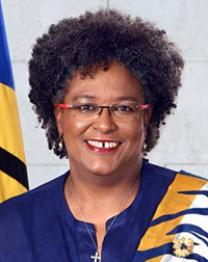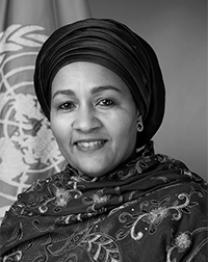
Extraordinary times call for extraordinary measures
Preparatory meeting on the road to UNCTAD15 and LDC5
The events of the past year have highlighted the various challenges facing all developing countries. This event focuses on the specific challenges facing the Least Developed Countries (LDCs). It aims to provide a dialogue space for Geneva and New York-based member States, UNCTAD experts and the wider UN community to come together to explore innovative, extraordinary strategies to address the trade and development challenges facing the LDCs.
It aims to generate intergovernmental consensus on these issues, which will serve as inputs to both the Fifteenth United Nations Conference on Trade and Development (UNCTAD 15) and the Fifth United Nations Conference on Least Developed Countries (LDC V) to have richer outcomes from those conferences in order to realize prosperity for all.
Background
The COVID-19 pandemic has plunged the global economy into unprecedented circumstances, reorganizing trade, travel and production networks. The least developed countries (LDCs) have felt these multiple shocks more acutely than any other groups of developing countries. The potential long-term impacts, including secondary and tertiary shocks, and spillover effects on production, job creation, household income, domestic finances and investment mean that LDCs will continue to face daunting challenges to their sustainable development.
In these extraordinary times, member States should reflect on the critical role of productive capacities in building back from crises and achieving sustainable development.
UNCTAD’s in-depth research has confirmed that productive capacities-induced structural transformation is the only long-term solution to LDCs’ vulnerabilities. Access to comprehensive investment, as well as inclusive technology and reinvigorated development partnerships play an increasingly important role in this process.
In a post-COVID scenario, LDCs are even more in need of sustainable development finance and ensuring their access to it will be critical for any meaningful recovery.
Key questions addressed:
- What are the priority trade and development-related challenges that LDCs need to address?
- What polices and support strategies should form the foundation of the next Programme of Action for the LDCs?
- What more can be done given the COVID-19 realities?
How can we plant the seeds at UNCTAD15 and LDC5 to enable LDCs to reap the benefits from transforming economies?In this context, what specific actions are required at UNCTAD15 and at LDC5?
Potential outcome
This high-level segment is expected to generate a set of Agreed Conclusions by Trade and Development Board on the priority policy issues and trade and development challenges facing LDCs.
The Agreed Conclusions aim to provide intergovernmental consensus as inputs to both the LDC5 preparatory process and UNCTAD 15. They will be disseminated to all relevant bodies in New York, including ECOSOC.
The insights of member States and discussions will be captured in the Chair’s Summary and Report of the 68th Session of the Trade and Development Board.
The Honourable Mia Amor Mottley, Q.C., M.P., became Barbados' eighth and first female Prime Minister on 25 May 2018.
Ms. Mottley was elected to the Parliament of Barbados in September 1994 as part of the new Barbados Labour Party Government.
Prior to that, she served as one of two Opposition Senators between 1991 and 1994. One of the youngest persons ever to be assigned a ministerial portfolio, Ms. Mottley was appointed Minister of Education, Youth Affairs and Culture from 1994 to 2001.
She later served as Attorney General and Deputy Prime Minister of Barbados from 2001 to 2008 and was the first female to hold that position.
Ms. Mottley is an Attorney-at-law with a degree from the London School of Economics, specialising in advocacy. She is also a Barrister of the Bar of England and Wales.
In 2002, she became a member of the Local Privy Council. She was also admitted to the Inner Bar, becoming the youngest ever Queens Counsel in Barbados.

Ms. Isabelle Durant, of Belgium, is Deputy Secretary-General of UNCTAD. From February to 12 September 2021, she headed the organization as Acting Secretary-General before the appointment of a new UNCTAD Secretary-General on 13 September 2021. Prior to holding this position, she served the organization for over three years as UNCTAD’s Deputy Secretary-General.
Ms. Durant had a distinguished career in Belgian and European politics. She held the offices of Deputy Prime Minister, Minister of Transport and Energy and Senator in the Belgian Government. She also served as Vice-President of the European Parliament and Presidency of the European Union Council of Ministers of Transport.
Ms. Durant has a wealth of experience collaborating with civil society and the private sector as well, notably as the Vice-President responsible for relations between the European Parliament and civil society. Finally, Ms. Durant has held posts as a senior consultant on the empowerment of women in local government for the UNDP and as a member of Parliament of the Brussels-Capital Region in Belgium.
Dr. Steve MacFeely is the Chief Statistician of the OECD and Director of the Statistics and Data Directorate. He is also an Adjunct Professor at the Department of Economics at University College Cork in Ireland. He chairs the Advisory Board of the Statistical Journal of the IAOS, the UN’s Productive Capacity Index Statistical and Technical Expert Group, and the Advisory Board of the International Statistics Literacy Project. Steve is an elected member of the International Statistics Institute. Prior to joining the OECD, Steve served as the Director of Data and Analytics at the World Health Organization.He also served as Director of the UNCTAD Statistics, where he played a key role in the development of TiSSTAT.
Before joining the UN, he was the Deputy Director-General at the Central Statistics Office (CSO) in Ireland.
Ms. Amina J. Mohammed is the Deputy Secretary-General of the United Nations and Chair of the United Nations Sustainable Development Group.
Prior to her appointment, Ms. Mohammed served as Minister of Environment of the Federal Republic of Nigeria where she steered the country’s efforts on climate action and efforts to protect the natural environment.
Ms. Mohammed first joined the United Nations in 2012 as Special Adviser to former Secretary-General Ban Ki-moon with the responsibility for post-2015 development planning. She led the process that resulted in global agreement around the 2030 Agenda for Sustainable Development and the creation of the Sustainable Development Goals.
Ms. Mohammed began her career working on the design of schools and clinics in Nigeria. She served as an advocate focused on increasing access to education and other social services, before moving into the public sector, where she rose to the position of adviser to four successive Presidents on poverty, public sector reform, and sustainable development.
Ms. Mohammed has been conferred several honorary doctorates and has served as an adjunct professor, lecturing on international development. The recipient of various global awards, Ms. Mohammed has served on numerous international advisory boards and panels.
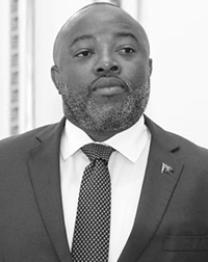
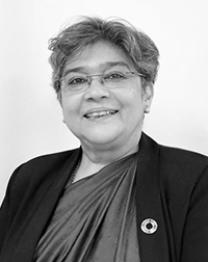
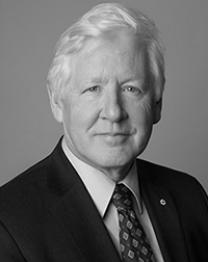
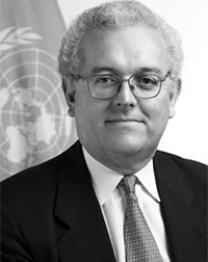
José Antonio Ocampo is director of the Economic and Political Development Concentration in the School of International and Public Affairs, Member of the Committee on Global Thought and co-President of the Initiative for Policy Dialogue at Columbia University. He is also the Chair of the Committee for Development Policy, an expert committee of the United Nations Economic and Social Council (ECOSOC). In 2012–2013 he chaired the panel created by the IMF Board to review the activities of the IMF’s Independent Evaluation Office; in 2008–2010, he served as co-director of the UNDP/OAS Project on “Agenda for a Citizens’ Democracy in Latin America”; and in 2009 a Member of the Commission of Experts of the UN General Assembly on Reforms of the International Monetary and Financial System.
Prior to his appointment, Ocampo served in a number of positions in the United Nations and the Government of Colombia, most notably as United Nations Under-Secretary General for Economic and Social Affairs; Executive Secretary of the Economic Commission for Latin America and the Caribbean (ECLAC); Minister of Finance and Public Credit, Chairman of the Board of Banco del República (Central Bank of Colombia); Director of the National Planning Department (Minister of Planning); Minister of Agriculture and Rural Development, and Executive Director of FEDESARROLLO.
Ocampo has published extensively on macroeconomic theory and policy, international financial issues, economic and social development, international trade, and Colombian and Latin American economic history.



